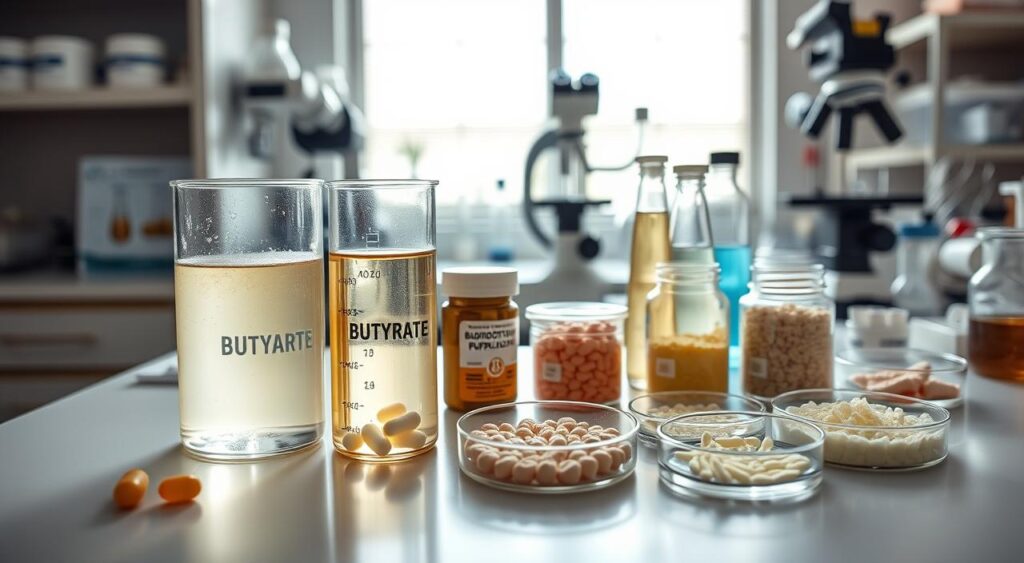Ever wondered why some diets make you feel full of energy, while others cause stomach pain? It might be because of butyrate, a key short-chain fatty acid. Butyrate is important for your gut health and overall health. We’ll look at natural ways to boost butyrate levels. You’ll learn about the best foods and lifestyle changes to improve your digestion and gut health.
Understanding Butyrate: The Essential Short-Chain Fatty Acid
Butyrate is a short-chain fatty acid made in your gut. It’s created when good bacteria break down dietary fiber. This important compound is the main energy source for colon cells and is key to your health.
Learning about butyrate shows its role in keeping your gut healthy. It also highlights its many health benefits.
What is Butyrate?
Simply put, butyrate is what good gut bacteria make when they digest fiber. It meets about 70% of colon cells’ energy needs. Eating more fiber helps increase butyrate in your gut.
Benefits of Butyrate for Your Health
The benefits of butyrate go beyond just energy. It helps with digestion, lowers inflammation, and boosts your immune system. Studies also suggest it may prevent diseases like colorectal cancer.
Having enough butyrate is vital. Low levels can cause digestive problems and weaken your immune system. So, it’s important to increase butyrate for better health.
How Butyrate Supports Gut Health
Butyrate is essential for gut health. It strengthens the intestinal barrier. This barrier keeps harmful bacteria out, improving digestion and protecting against diseases like IBS and Crohn’s disease.
Eating foods that boost butyrate production can make your gut healthier.
To learn more about butyrate and its effects, visit this source: understanding butyrate. By eating more fiber and supporting healthy gut bacteria, you can unlock butyrate’s full benefits for your gut health.
The Role of Dietary Fiber in Butyrate Production
Dietary fiber is key to making butyrate, showing how important types of fiber for butyrate are. Adding certain fibers to your diet helps make this important fatty acid. This supports your gut health.
Types of Fiber That Promote Butyrate
Knowing about different dietary fibers is vital for boosting butyrate. Soluble fiber is great because it ferments in the gut. This makes short-chain fatty acids, like butyrate. Eating more soluble fiber can improve your health.
Foods Rich in Soluble Fiber
Eating foods high in soluble fiber boosts butyrate production. Good choices include:
- Oats
- Legumes like lentils and chickpeas
- Fruits like apples, pears, and citrus fruits
- Barley
These butyrate boosting foods help grow good gut bacteria. They also support your digestive system.
Foods Rich in Insoluble Fiber
Insoluble fiber, though less fermentable, is also vital for gut health. It keeps your bowels regular and aids digestion. Foods rich in insoluble fiber are:
- Whole grains like brown rice and whole wheat bread
- Vegetables such as carrots, broccoli, and cauliflower
- Nuts and seeds
Eating these dietary fiber sources daily helps balance butyrate levels in your gut.
Incorporating Resistant Starch into Your Diet
Adding resistant starch to your diet is a smart move for boosting butyrate naturally. Resistant starch is a type of fiber that doesn’t get digested in the small intestine. It goes to the colon, where it feeds the good bacteria. This process makes butyrate, a fatty acid that’s great for your gut.
What is Resistant Starch?
Resistant starch is unique because it doesn’t break down like regular carbs. It stays whole until it hits the colon. There, the good bacteria turn it into butyrate. This fatty acid helps fight inflammation and keeps your gut healthy.
Top Sources of Resistant Starch
Adding foods rich in resistant starch to your meals can boost butyrate. Here are some great options:
- Green bananas
- Cooked and cooled potatoes
- Legumes, such as lentils and chickpeas
- Whole grains like oats
- Cooked and cooled pasta
These foods are packed with resistant starch, making them great for your gut health.
Cooking Tips to Maximize Resistant Starch
How you cook food can affect its resistant starch content. Here are some tips:
- Cook and cool starchy foods. Let them cool in the fridge to increase resistant starch.
- Reheat cooled starchy foods. This doesn’t lower the resistant starch much.
- Try different sources in your meals for more benefits and flavors.

The Impact of Fermented Foods on Butyrate Levels
Fermented foods are key to boosting butyrate levels in our bodies. They go through a fermentation process. This process breaks down fibers and makes nutrients more available.
By eating these foods, we help our gut health. We also support the creation of good short-chain fatty acids like butyrate.
Understanding Fermented Foods
Fermented foods are full of probiotics. These probiotics help create a diverse gut microbiome. This diversity is key for good digestion and butyrate production.
When we eat these foods, the good bacteria help break down fibers. This makes digestion easier and supports butyrate creation.
Best Fermented Foods to Try
Here are some top fermented foods for boosting butyrate levels:
- Yogurt
- Kefir
- Sauerkraut
- Kombucha
- Miso
- Tempeh
Adding these foods to your diet can greatly improve your gut health and overall health.
How Fermented Foods Influence Gut Flora
Fermented foods greatly affect our gut flora by adding good bacteria. This increase in beneficial bacteria helps break down fibers. It also boosts butyrate production.
A healthy balance of gut flora is essential. It keeps butyrate levels and gut function at their best.

The Importance of Prebiotics for Butyrate
Prebiotics are key for gut health because they feed good bacteria. They are fibers that can’t be digested by our bodies. These fibers help grow beneficial bacteria, which is important for making butyrate.
Knowing about prebiotics helps you choose better foods. This can improve your overall health.
What Are Prebiotics?
Prebiotics are special plant fibers that feed good gut bacteria. Eating these fibers helps grow beneficial bacteria. This makes your gut healthier and boosts butyrate levels.
Foods High in Prebiotics
Eating foods rich in prebiotics is good for your gut. Here are some:
- Garlic
- Onions
- Asparagus
- Leeks
- Bananas
- Chicory root
These foods not only taste great but also help make butyrate.
How Prebiotics Assist in Butyrate Production
Prebiotics are vital for butyrate because they support good bacteria. When these bacteria break down prebiotics, they make butyrate and other fatty acids. This boosts butyrate and keeps your gut balanced, which is key for health.

How Probiotics Can Help Increase Butyrate
Probiotics are key to keeping your gut healthy and boosting butyrate levels. These live microorganisms help balance your gut’s bacteria. They also support bacteria that make butyrate. Learning how probiotics can boost butyrate naturally is a big win for your digestive health.
What Are Probiotics?
Probiotics are live bacteria and yeasts that are good for your gut. They keep your gut microbiome balanced, which is vital for making butyrate. By taking probiotics, you can better your gut health and encourage butyrate-producing bacteria to grow.
The Connection Between Probiotics and Butyrate
Studies show a clear connection between probiotics and butyrate levels. Some probiotic strains boost butyrate production by improving your gut’s environment. This not only aids digestion but also brings systemic benefits linked to more butyrate.
Probiotic-Rich Foods to Consider
Eating probiotic-rich foods is a smart way to support butyrate production. Here are some great choices:
- Yogurt: A common source of live cultures.
- Kimchi: A fermented veggie dish rich in good bacteria.
- Kefir: A fermented drink with a variety of probiotics.
- Miso: A fermented soybean product full of probiotics.
- Tempeh: A fermented soy product that’s also high in fiber, aiding butyrate production.

The Role of Omega-3 Fatty Acids in Gut Health
Omega-3 fatty acids are key for gut health. They have anti-inflammatory effects. This helps keep the gut microbiome balanced and boosts butyrate levels. Adding omega-3s to your diet can greatly improve your gut health.
Benefits of Omega-3s for Your Gut
Omega-3s help reduce inflammation in the digestive tract. This can ease symptoms of irritable bowel syndrome (IBS) and strengthen the gut lining. They also support the growth of good gut bacteria, improving digestion.
Top Sources of Omega-3 Fatty Acids
Knowing the best sources of omega-3s is important for a balanced diet:
- Fatty fish: Salmon, mackerel, and sardines are excellent choices.
- Flaxseeds: Ground flaxseeds are easy to add to smoothies, oatmeal, or baking recipes.
- Chia seeds: These tiny powerhouses can be sprinkled over salads or mixed into yogurt.
- Walnuts: A handful of walnuts serves as a great snack or salad topping.
Incorporating Omega-3s into Your Meals
To enjoy the benefits of omega-3, start adding them to your meals. Here are some ideas:
- Add grilled salmon to your salads for a filling and nutritious option.
- Blend chia seeds into fruit smoothies for a nutritious breakfast.
- Top your oatmeal with ground flaxseeds and walnuts for a satisfying meal.
This way, omega-3 fatty acids for gut health will become a regular part of your diet.
Staying Hydrated for Optimal Gut Function
Drinking enough water is key for good health, and it’s even more important for your gut. Drinking water helps your body digest food and work with dietary fiber. This helps make butyrate, which is good for you.
Why Hydration Matters for Butyrate Production
Drinking water is vital for making butyrate. Water helps break down food, making fiber work better in your gut. When fiber breaks down, it makes butyrate, which is great for your health. Without enough water, your body can’t digest fiber well, which stops butyrate from forming.
Tips for Increasing Your Water Intake
- Aim for 8-10 cups of water daily to stay well-hydrated.
- Incorporate hydrating foods like cucumbers, watermelon, and oranges into your meals.
- Keep a water bottle handy to remind yourself to drink throughout the day.
- Set reminders on your phone or use apps to track your water intake.
Other Hydration Options Beyond Water
If you want more ways to stay hydrated, try other drinks too. Herbal teas can hydrate you and offer health benefits. Clear broth is also good for meals and helps with staying hydrated. These drinks are great for adding variety to your hydration routine.
Lifestyle Factors That Influence Butyrate Production
Your daily habits greatly affect butyrate production, a key short-chain fatty acid for gut health. It’s important to know how lifestyle choices can boost your well-being. Let’s look at how sleep, stress management, and exercise impact butyrate levels.
The Effects of Sleep on Gut Health
Quality sleep is key for gut repair and beneficial bacteria function. Rest helps your body make butyrate better. Research shows poor sleep can upset the gut microbiome balance.
Getting seven to nine hours of sleep helps your gut work best.
How Stress Impacts Your Gut
Long-term stress can upset the gut microbiota, affecting butyrate making. Stress management, like mindfulness, yoga, or deep breathing, can help. It improves your gut microbiome and boosts butyrate production.
Exercising for a Healthier Gut
Regular exercise is good for gut health, improving blood flow and microbial diversity. It helps create a strong microbiome that boosts butyrate. Mix aerobic and strength training to keep your gut healthy and butyrate levels high.
Monitoring Your Gut Health
It’s important to keep an eye on your gut health for your overall well-being. Regular checks can show you how your diet affects your health, like butyrate levels. Here are key points to think about when you’re monitoring your gut health.
Benefits of Keeping a Food Journal
Keeping a food journal gives you insights into your eating habits. It helps you see which foods boost butyrate levels and find out if you have food allergies. Writing down what you eat makes you more aware of how different foods affect your gut.
Signs of Healthy Butyrate Levels
Knowing the signs of healthy butyrate levels helps you make better food choices. Good signs include regular bowel movements, steady energy, and a strong immune system. Watching these signs is key to keeping your gut healthy, as they show how well your digestive system is working.
When to Consult a Healthcare Professional
If you’re dealing with digestive problems or ongoing gut issues, it’s time to see a healthcare professional. Issues like persistent discomfort, bloating, or irregular bowel movements might mean butyrate levels are off. Getting expert advice can help fix these problems and keep your gut health in check.
Practical Tips for Increasing Your Butyrate Naturally
Boosting butyrate in your body is easy. Just make a few simple changes to your diet. Eat more fruits, veggies, and whole grains to up your fiber. Foods like yogurt and garlic also help with gut health.
Simple Dietary Changes to Start Now
Add resistant starch to your meals, found in green bananas and cooled potatoes. It’s great for butyrate. Meal prep can be easier with these ingredients ready. Try mixing them with fermented foods like sauerkraut for a tasty, gut-friendly dish.
Meal Prep Ideas for Butyrate-Boosting Meals
Plan meals with different fiber sources. Use legumes, whole grains, and fruits. This mix not only tastes good but also supports a healthy gut. Remember, staying hydrated is key for gut health too.
Creating a Balanced Gut-Friendly Plan
Combine diet changes, hydration, and lifestyle habits for a complete plan. Small daily changes can make a big difference. They help create a happier, healthier gut.



